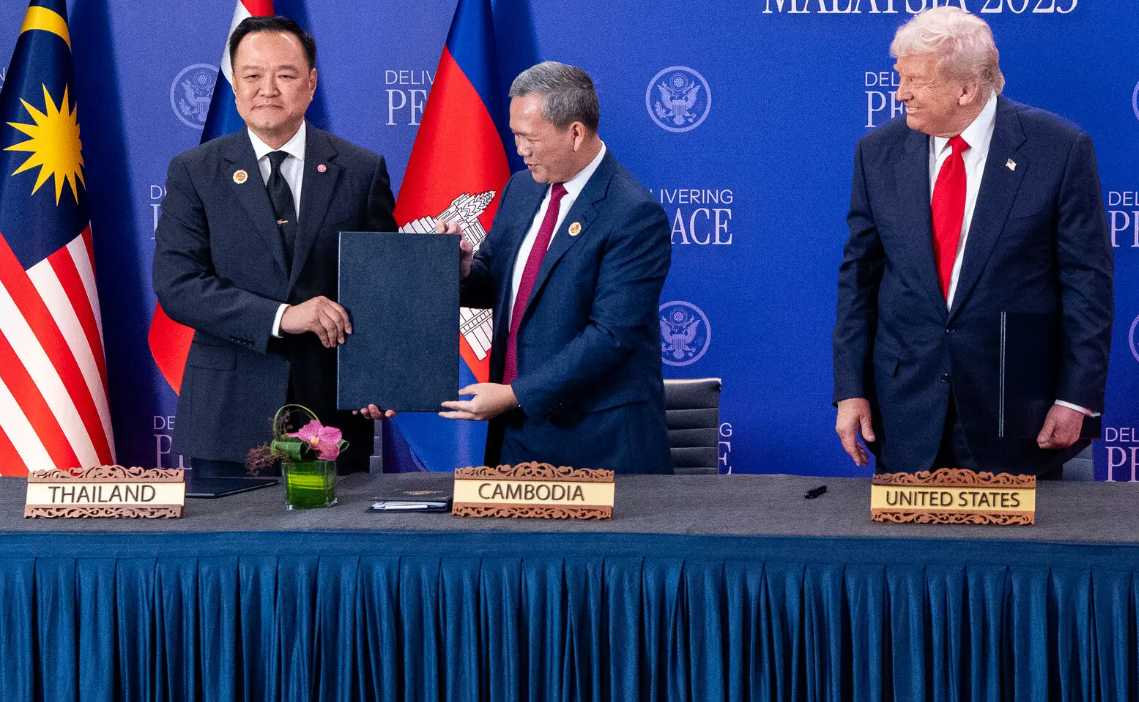US arms embargo lifted, Trump's (immediate) reward for Cambodia
Just days after signing a deal with Thailand to defuse the (simmering) conflict over the disputed border, the US administration revoked the measure adopted in 2021 by the Biden administration. The ban was linked to China’s Ream naval base, but also to Cambodia’s human rights situation (which has worsened).
Washington (AsiaNews/Agencies) – The United States has lifted the arms embargo it had imposed on Cambodia.
The move comes a few days after Cambodia and Thailand signed a ceasefire agreement at a ceremony last week on the sidelines of the ASEAN summit in Kuala Lumpur, owing to Donald Trump's strong insistence, following mediation in a conflict that left scores of people dead and thousands displaced last summer.
The Biden administration had imposed the ban on arms exports to Cambodia in 2021, citing China's growing military influence in the country, as well as concerns over human rights and corruption. Now, US Secretary of State Marco Rubio lifted the restrictions.
"Based on Cambodia’s diligent pursuit of peace and security, including through renewed engagement with the United States on defense cooperation and combating transnational crime, the Secretary of State made a determination to lift the embargo on defense trade with Cambodia," reads a notice in the Federal Register.[*]
The notice specifies that arms sales to Cambodia will henceforth be authorised on a case-by-case basis and subject to specific criteria.
This is a clear reward for Cambodia, which has been flattering the US, with Prime Minister Hun Manet announcing his support for Trump's candidacy for the Nobel Peace Prize.
It is unclear, however, how US concerns about Chinese military influence in Cambodia have been addressed.
For years, US defence officials have expressed concerns about the expansion of the Ream Naval Base, which could provide China with an outpost near the disputed South China Sea.
Meanwhile, on the sidelines of a meeting in Malaysia, US Secretary of Defense Pete Hegseth and his Cambodian counterpart Tea Seiha agreed on 31 October to resume the Angkor Sentinel joint military exercises, suspended in 2017.
By contrast, it is certain that Cambodia has not made any progress in human rights.
At the end of August, taking advantage of the nationalist wave sparked by the conflict with Thailand, Senate President Hun Sen – the father of the current prime minister and the country’s strongman – had the upper house pass a law allowing the government to strip Cambodians of their citizenship if they are found to be in collusion with a foreign country or responsible for actions deemed harmful to Cambodia’s sovereignty, territorial integrity, and national security.
According to human rights groups, this is another weapon against dissent, which is already to all intents and purposes banned in the country. Cambodia currently has more than 60 political activists in jail, convicted of crimes ranging from incitement to treason. Many are in exile.
One of the high-profile cases is that of Theary Seng, a Christian activist and editor of the Khmer edition of the Bible with dual Cambodian-US citizenship, who is in prison.
Under the new law, opposition politicians such as Sam Rainsy and Mu Sochua, both dual citizens and in exile after being convicted of treason, could be stripped of their citizenship.
Kem Sokha, another opposition leader currently serving a 27-year sentence for treason, and environmentalists from the Mother Nature movement, who have been in prison for a year now for "conspiring" against the government, have fewer options as they hold only Cambodian citizenship.
[*] Official journal of the federal government of the United States.
05/07/2024 19:21







.png)










